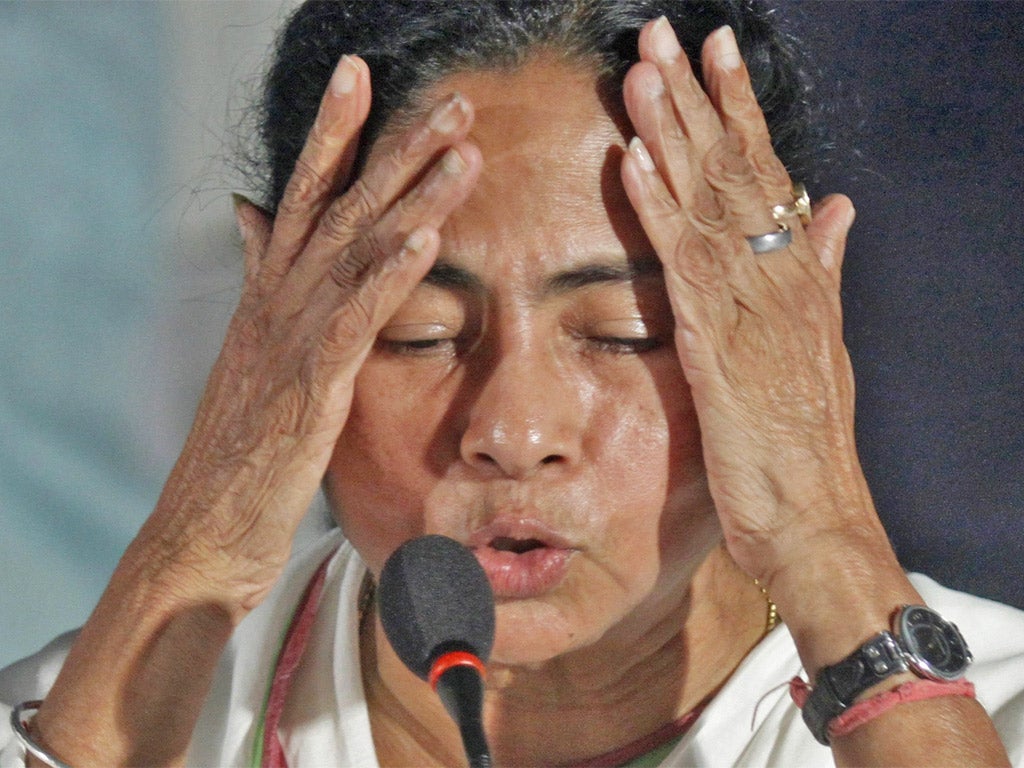India's government on brink of collapse

Your support helps us to tell the story
From reproductive rights to climate change to Big Tech, The Independent is on the ground when the story is developing. Whether it's investigating the financials of Elon Musk's pro-Trump PAC or producing our latest documentary, 'The A Word', which shines a light on the American women fighting for reproductive rights, we know how important it is to parse out the facts from the messaging.
At such a critical moment in US history, we need reporters on the ground. Your donation allows us to keep sending journalists to speak to both sides of the story.
The Independent is trusted by Americans across the entire political spectrum. And unlike many other quality news outlets, we choose not to lock Americans out of our reporting and analysis with paywalls. We believe quality journalism should be available to everyone, paid for by those who can afford it.
Your support makes all the difference.India's government is scrambling for a political lifeline after an important coalition ally said it was withdrawing its support in protest over a series of economic reforms, including a decision to allow foreign retailers to enter the country.
The Congress Party-led coalition could be left in a minority position after the Trinamool Congress, headed by Mamata Banerjee, the mercurial chief minister of West Bengal, said it was quitting.
The government has until Friday lunchtime to find alternative support for the coalition or else reach an agreement with Ms Banerjee and persuade her to remain.
“We have decided we are not going to be part of [the government.] We have decided to withdraw our support,” Ms Banerjee had said on Tuesday evening in Kolkata, announcing her party's decision.
Under intense criticism over its perceived policy paralysis, the government last week announced it had agreed to give the go-head to foreign direct investment (FDI) in retail, opening the way for stores such as Wal-Mart and Tesco to operate in India. It also raised the price of diesel by five rupees.
Though the government had made clear it was up to individual states to decide whether or not to proceed with FDI in retail, Ms Banerjee has opposed the measure, not just for West Bengal, but for all of India, saying the move will hurt countless millions of small shop-keepers and farmers. She has said the will formally leave the government on Friday.
For now both sides are playing hardball. After a meeting of senior Congress leaders including Prime Minister Manmohan Singh and party president Sonia Gandhi, finance minister P Chidambaram told reporters: “I don't know why you guys are hung up on that one word rollback. These issues were taken after the most careful consideration. They stand.”
Yet while the government will not want to drop its commitment to FDI - especially since it has already backtracked once after pressure from Ms Banerjee - it may be prepared to move on diesel and other economic issues, including raising the number of subsidised cooking gas cylinders it is prepared to give to the poor. “Mamata has gotten to where she is because she is an ace at playing populist politics,” Mani Shankar Aiyar, a Congress politician from the upper house of India's parliament, told The Independent. “There is room for compromise, but whether it is a compromise both sides find acceptable I don't know.”
Ashok Malik, a leading journalist and commentator said he believed the government was committed to FDI - “it's like you're either pregnant or you're not pregnant, you can't be halfway there” - but said that it could compromise in some of the other areas. “Manmohan Singh would look very stupid and the government would look very stupid if it backed down on FDI,” he added.
If Ms Banerjee goes ahead with her threat, it would reduce the official government coalition's strength in the lower house of the parliament to 254 - 19 short of a majority. However, the government can turn to other smaller parties such as the Samajwadi Party and the Bahujan Samaj Party, headed by Kumari Mayawati, who has traditionally drawn her support from lower-caste groups, which have been supporting it in the parliament.
Both would likely want to extract more from the government for offering their support in terms of positions in government and other such measures. Indeed, the SP has already started to manoeuvre with the party's leader, Mulayam Singh Yadav, telling reporters that the government is weak and arrogant. He added: “The government should get some political sense.”
Join our commenting forum
Join thought-provoking conversations, follow other Independent readers and see their replies
Comments